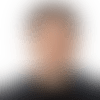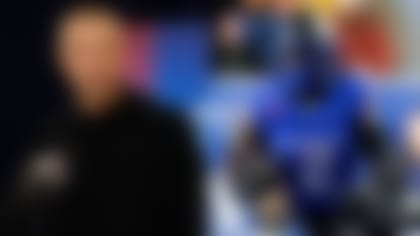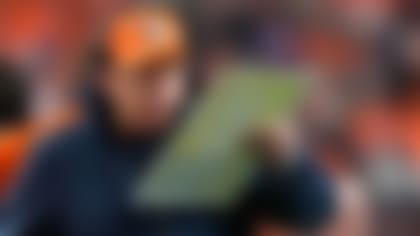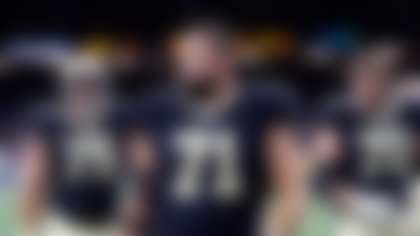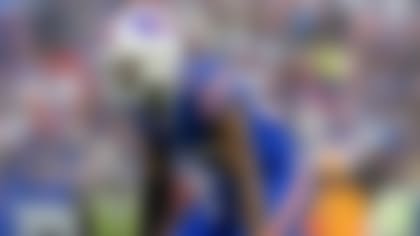It's not just that the Chiefs wanted to replace Alex Smith. He knew that was coming. It was how badly they wanted to draft a quarterback entirely unlike him.
It was as if coach Andy Reid carefully broke down Smith's strengths and weaknesses, then said: "Yo, get me the opposite of that!"
Chicago's confounding trade-up for Mitchell Trubisky overshadowed the massive bounty that Kansas City gave up to select Patrick Mahomes: Two first-round picks and a third-rounder. If that's the cost of acquiring a young quarterback, no wonder the Patriots were loath to trade Jimmy Garoppolo.
Mahomes is such a fascinating fit in K.C. because he's so talented, so raw and is joining such a strong roster. While another famous Reid pupil, Donovan McNabb, didn't take enough chances, Mahomes takes too many. Mahomes routinely completed throws in college that Alex Smith wouldn't dare try.
It will take time for Mahomes to develop, so Smith's starting job remains secure in 2017. But everything about the veteran signal caller's job just got tougher. Nearly every interview that Smith gives will include questions about Mahomes. Every two-game losing streak or third-and-long pass that Smith chooses to throw short of the sticks will rile up fans pining for a future filled with more fireworks.
Smith will handle it all like a professional, like someone who's been through this before, like someone who knows deep down that he's not the type of player his coach dreams of.
Smith was just one of many NFL veterans who suffered collateral damage during the 2017 NFL Draft. Here are the rest:
Jeremy Hill, RB, Cincinnati Bengals: The Bengals' decision to draft running back Joe Mixon raises complicated moral questions, in part because of the NFL's complicity in supporting a man after he was caught punching and knocking out fellow Oklahoma student Amelia Molitor. The Bengals' opinion on Mixon's ability is far less complex.
"I'm so excited I can hardly stand myself," Bengals offensive coordinator Ken Zampese said about Mixon's skill set.
It's safe to say that Zampese doesn't feel the same about incumbent starter Jeremy Hill. The Bengals wouldn't draft Mixon -- and all his baggage -- if they didn't believe he can make a big impact. Coach Marvin Lewis traditionally brings his rookies along slowly, but Mixon's complete game will be difficult to keep off the field. He has better feet, vision, speed and hands than Hill. Once Gio Bernard is recovered from a torn ACL, it won't be surprising if Hill's role in the offense erodes into rubble.
Eli Manning, QB, New York Giants: First-round tight end Evan Engram is a fun addition to a loaded receiver group, but the Giants drafted Manning's potential successor in Round 3 (Davis Webb) and only addressed their offensive line with hope.
Speaking on WFAN, Giants general manager Jerry Reese cited the youth of left tackle Ereck Flowers and right tackle Bobby Hart, expecting them to make a significant jump in 2017. This entire Giants roster, which otherwise looks more promising than it has in years, could depend on Reese's wishful thinking coming true.
T.J. Yeldon and Chris Ivory, RB, Jacksonville Jaguars: Remember back in 2015 when Jaguars general manager David Caldwell took Yeldon at No. 36 overall, over options like David Johnson, Jay Ajayi, Tevin Coleman and Duke Johnson? Caldwell's selection of Leonard Fournette is a bid to help make everyone forget.
Once considered a "safe" pick because he could do a little bit of everything, Yeldon doesn't do anything at the pro level particularly well. Now he'll be stuck in a clear backup role behind Fournette, a role that suits Yeldon's skill set well.
Mike Glennon, QB, Chicago Bears: Less than two months after signing with the Bears to be their starter, Glennon reportedly "felt as though he had been cheated on" when the team traded up for Mitchell Trubisky.
Glennon was always only guaranteed one year in Chicago, but now he won't get a fair chance at that. The Bears should be using every first-team snap on Glennon to help him learn a new offense. Instead, the team will have to split up the practice reps with Trubisky to develop the rookie. Throw in a lame-duck coach in John Fox who reportedly was just as surprised about the Trubisky trade and the Bears have concocted a recipe for dysfunction this season.
Tajae Sharpe, WR, Tennessee Titans: One of the best stories of the 2016 offseason, Tennessee's fifth-round pick from last season largely vanished in plain sight once the regular season began. The Titans drafted Corey Davis to usurp Sharpe on the outside, and third-round pick Taywan Taylor figures to gobble up snaps and targets from the slot.
Latavius Murray, RB, Minnesota Vikings: Murray's draft experience sounds similar to Mike Glennon's, minus getting publicly humiliated at a team draft party. Expected to take over a high-profile starting job, Murray watched his team trade up for his replacement.
At best, Murray will keep Adrian Peterson's old seat warm until second-round pick Dalvin Cook takes over. It's more likely that Cook's versatile skill set wins the team's starting job sooner than later, with underrated third-down back Jerick McKinnon also hanging around.
Calvin Pryor, S, New York Jets: The best safety on the team should absolutely see it as a message when the front office drafts safeties in each of the first two rounds. On the bright side, Pryor has lasted longer on the team than most of former general manager John Idzik's draft picks.
Tyrell Williams, WR, Los Angeles Chargers: The most unsung, eye-opening 1,000-yard season in the NFL last year was overlooked -- even in the receiver's own building. No. 7 overall pick Mike Williams is a very different player than Tyrell Williams, but the rookie is bound to cut into his new teammate's snaps. Pity the defense that has to deal with the Chargers when they go four wide with Keenan Allen, both Williamses and Travis Benjamin.
Matt Jones, RB, Washington Redskins: Any chance for a MattJonesaissance left Washington with deposed general manager Scot McCloughan. NFL Network Insider Ian Rapoport reported during the draft that Jones was available in a trade, news that came before the team drafted Samaje Perine, another power running back over 230 pounds. I haven't given up on Jones, who averaged 4.6 yards per carry in seven starts last season. The Redskins have given up on him and he is unlikely to make the team out of training camp behind Rob Kelley and Chris Thompson -- if Jones even makes it that far.
David Amerson and Sean Smith, CB, Oakland Raiders: Oakland's decision to draft Gareon Conley was a nod to the future. He's a physical press-man coverage cornerback on the outside, just like the team's two expensive starters, Amerson and Smith. The guaranteed money in both players' contracts runs out after this season, so they will be under pressure to perform in 2017 or lose their jobs. Amerson, who has experienced a roller-coaster career, is the one more at risk.
Gary Barnidge, TE, free agent: Barnidge makes the list as the most prominent and obvious subset of players hurt by the draft: Guys who have already lost their jobs. Only 16 months removed from a contract extension, Barnidge racked up 1,655 yards over the last two seasons in Cleveland. Hue Jackson and company didn't think Barnidge belonged anymore after drafting David Njoku in the first round, but some team should wind up making him a starter.
Tom Savage, QB, Houston Texans: Savage's hold on his starting job is more tenuous than any quarterback on this list. Texans rookie Deshaun Watson appears to be the most pro-ready rookie, and Savage is entering the final year of his contract. It doesn't help Savage that coach Bill O'Brien likes changing quarterbacks as much as Joe Torre liked changing seventh-inning relievers.
Sammie Coates, WR, Pittsburgh Steelers:Martavis Bryantwas right. Second-round pick JuJu Smith-Schuster is likely to take Coates' role on the team, not Bryant's. Whereas Bryant is one of the NFL's most dynamic deep threats when he's on the field, Coates drops the ball far too much for a one-dimensional player.
Mark Ingram, RB, New Orleans Saints: From the team that once brought you Ingram, Chris Ivory, Pierre Thomas and Reggie Bush in the same backfield, the Saints would like to present Ingram, Adrian Peterson and Alvin Kamara.
The Saints didn't trade away next year's second-round pick to San Francisco to sit Kamara on the bench. While he'll play the "satellite back" role that Bush and Darren Sproles manned in the past, Kamara is bound to step on Ingram's passing down snaps. Ingram has never played more than 550 snaps in a season and that's not about to change.
